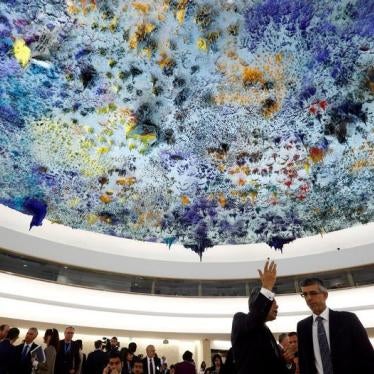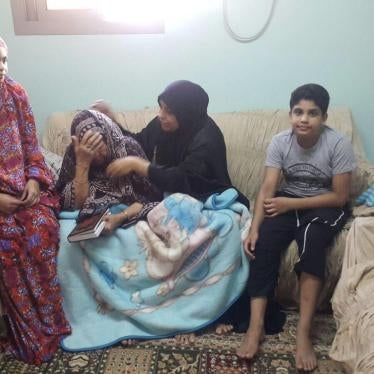(Beirut) – The Formula One Group disregards its human rights commitments and overlooks grave rights abuses in Bahrain, Human Rights Watch said today. Some of the abuses appear to be directly related to Formula One’s activities in the country.
Bahrain has a longstanding record of arresting and harassing dissents, including those opposing the Grand Prix races, which are scheduled this year for March 31, 2019. But the Formula One organizers rely on baseless assurances from the Bahraini authorities claiming respect for human rights. Formula One’s governing body, the Fédération Internationale de l'Automobile (FIA), should adopt and carry out a human rights policy that would identify risks and make use of its leverage to end rights abuses.
“Formula organizers should not look the other way while Bahrain uses the publicity and grandeur of the races while stepping up repression against people who oppose holding the race in Bahrain,” said Minky Worden, global initiatives director at Human Rights Watch.
Human Rights Watch is encouraging concerned athletes and people around the world to write directly to FIA President Jean Todt and Formula One Chairman Chase Carey. The letter writers should encourage Formula One to adopt a human rights policy similar to those recently adopted by companies and other major sporting organizations, including the Fédération Internationale de Football Association (FIFA).
Since 2011, Bahraini demonstrators have used the occasion of the Formula One races to protest the country’s human rights record, and every year, the Bahraini authorities respond with repression to close down the protests, Human Rights Watch said.
During the 2012 Grand Prix protests in which tens of thousands of protesters called for cancelling the race, police shot dead one protestor. In the lead up to the 2013 races, security forces conducted a series of home raids and arbitrarily detained opposition protesters in towns close to the Bahrain International Circuit. During the raids, the authorities arrested at least 20 people, including prominent anti-government figures, and security forces shot protesters in the head with tear gas canisters.
In April 2017, the authorities arrested Najah Yusuf, an activist and blogger, after she released a series of posts critical of the 2017 Bahrain Grand Prix. Yusuf, in a written statement, said that National Security Agency (NSA) officers allegedly interrogated and subjected her to physical abuse, sexual assault, and psychological torture. She said they forced her to sign a prepared confession. In June 2018, she was sentenced to three years in prison for her social media activity.
Human Rights Watch reviewed the evidence submitted by the public prosecution and found that it heavily relies on her social media posts expressing her opposition to holding the Formula One races in Bahrain. The Bahrain High Criminal Court cited her peaceful criticism of the Grand Prix in the judgment against her.
On February 6, Human Rights Watch and 16 other human rights groups sent a letter to Formula One urging it to uphold its commitment to human rights by publicly calling on the Bahraini authorities to drop the charges against Yusuf related to her exercise of her right to free speech, release her immediately, and hold anyone responsible for her ill-treatment or torture to account.
Formula One responded on March 4, citing the Bahraini authorities’ claims that Yusuf’s charges and conviction have “absolutely no relation to the Formula One race.” Formula One indicated in its reply that it relies on assurances from the Bahraini authorities that “no punitive measures will be taken against any other activists” for peaceful opposition to the races, and that such measures “[were] not and never would be” exercised by the Bahrain authorities.
Such claims are clearly untrue, given the spate of arrests and convictions ahead of the races every year. Taking these claims at face value also ignores the persistent human rights violations in Bahrain. The Bahraini authorities regularly imprison and convict peaceful demonstrators and human rights defenders, many of whom have alleged serious violations, including torture, in detention. Security forces have used excessive, and at times deadly, force against protesters. Officials who ordered or participated in these abuses have yet to be held to account. Bahrain’s pursuit of peaceful critics includes persecution overseas, as in the case of the refugee football player Hakeem al-Araibi.
In keeping with the Organisation for Economic Cooperation and Development’s (OECD) Guidelines for Multinational Enterprises, Formula One has a duty to prevent or mitigate adverse human rights impacts resulting from its business operation. Formula One’s own policy also requires it to consider the human rights impact of its activities and conduct the necessary due diligence to prevent such abuses. The United Nations Guiding Principles on Business and Human Rights state that business enterprises have a responsibility to “avoid causing or contributing to adverse human rights impacts through their own activities,” “address such impacts when they occur,” and “seek to prevent them.”
The recent creation of the Geneva-based Center for Sports and Human Rights and FIFA’s adoption of an internal human rights policy demonstrate a marked shift in the sporting world’s understanding that the rules of human rights apply to it too. FIFA, the International Olympics Committee (IOC), and the Center for Sports and Human Rights were instrumental in seeking the release of al-Araibi, from a Thai prison earlier this year.
Formula One has taken its Grand Prix Race to other deeply repressive counties, including Azerbaijan, while similarly claiming that it “is committed to respecting internationally recognized human rights in its operations globally.” Human Rights Watch and the Sport and Rights Alliance have met with and pressed Formula One to meaningfully carry out that pledge.
“Formula One has an opportunity to join other sporting organizations in advancing the respect for human rights in the areas in which it operates,” Worden said. “Adopting a human rights policy is the best way to avoid being driven to endorse repressive host countries’ abusive records.”









